Major Types Eco-Farming

Organic Farming
The most well-known kind of eco-farming is organic farming. It highlights staying away from pesticides, industrial fertilizers, and genetically modified organisms (GMOs).

Biodynamic Farming
This all-encompassing method incorporates moon cycle-based planting and harvesting periods as well as biodynamic preparations, going beyond organic methods.

Permaculture
Permaculture is a design philosophy that aims to build productive and sustainable farms by imitating natural ecosystems. Permaculture practitioners aim to create productive and sustainable systems that benefit both humans and the environment.
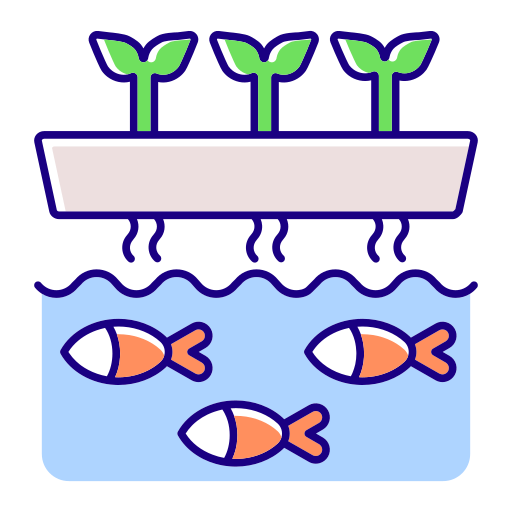
Aquaponics
This novel technique blends hydroponics—the soilless plant growth method—with aquaculture, the rearing of fish. While the plants filter the water for the fish, the fish waste supplies the plants with nutrients.
Explore More About Eco-Farming Methods
- Organic Farming
- Biodynamic Farming
- Permaculture
- Aquaponics
-
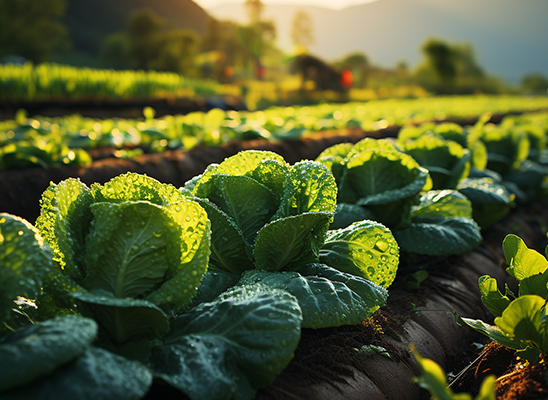
The Organic Approach: Prioritizing Food Quality and Environmental Health
Organic farming techniques are the foundation of eco-farming because they put the quality of your food and the health of the environment first. Genetically modified organisms (GMOs), insecticides, and synthetic fertilizers are all legally forbidden. Rather, in order to preserve soil fertility, organic farmers rely on organic techniques like crop rotation. They use composted debris to feed their crops and draw beneficial insects to help reduce pests. This method not only protects the environment but also frequently produces food that is healthier and tastes better.
-
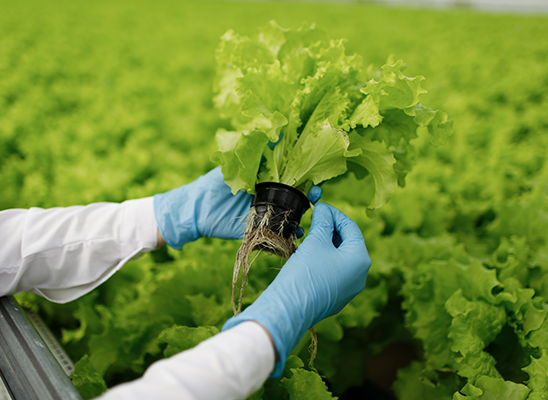
Biodynamic Farming: Beyond Organic with Lunar Rhythms
Building on organic principles, biodynamic farming adopts a comprehensive approach. It includes biodynamic remedies, which are particular concoctions said to improve crop vitality and soil life. In order to maximize development, planting and harvesting schedules are also carefully scheduled according to lunar cycles. The goal of biodynamic farming is to establish a strong bond between the farm and the natural world by developing a self-sufficient ecosystem on their property.
-
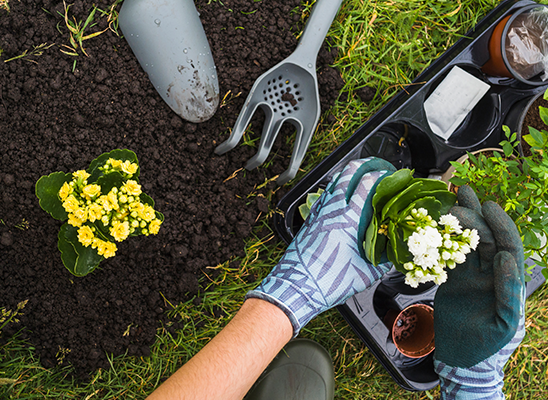
Holistic Harmony: Permaculture's Design Approach
Building on organic principles, biodynamic farming adopts a comprehensive approach. It includes biodynamic remedies, which are particular concoctions said to improve crop vitality and soil life. In order to maximize development, planting and harvesting schedules are also carefully scheduled according to lunar cycles. The goal of biodynamic farming is to establish a strong bond between the farm and the natural world by developing a self-sufficient ecosystem on their property.
-
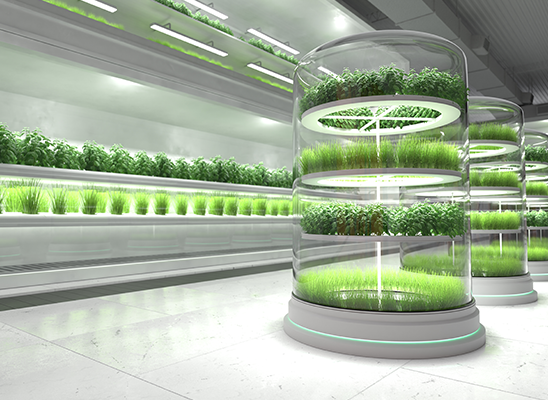
Aquaponics: The Future of Sustainable Food Production
This novel approach raises the bar for environmentally responsible farming to a whole new level. Envision a closed-loop ecosystem in which plants and fish coexist and prosper! Aquaponics is the marriage of hydroponics—the soilless plant production method—and aquaculture, or the rearing of fish. Fish feces gives plants a natural supply of nutrients, and the plants in turn filter the fish's water. In doing so, a symbiotic connection is established that increases resource efficiency, minimizes waste, and conserves water. An innovative method of eco-farming that has tremendous opportunities for efficient and sustainable food production is aquaponics.
-

Gated Community Farms
-

High Value trees
-

Water Management
-

Proper Electricity Connection
-

Man Power Support

Eco-Farming: Cultivating a Healthier Planet
Eco farming transcends organic food production, acting as a powerful tool for environmental healing. By prioritizing natural methods like composting and crop rotation, eco-farming fosters a thriving soil ecosystem teeming with beneficial life, improves water retention, and promotes biodiversity through reduced chemical use. This creates a haven for pollinators and keeps pests in check naturally. Additionally, healthy soil acts as a carbon sink, capturing climate-warming carbon dioxide, and reduced reliance on chemical fertilizers minimizes energy consumption. Eco-farming is a holistic approach to agriculture, ensuring clean water sources, healthy ecosystems, and a sustainable future where food production and environmental well-being are not at odds.
Beyond Organic: The Powerful Benefits of Eco-Farming
Environmental Sustainability: Eco-farming prioritizes the health of the planet. By eliminating synthetic fertilizers and pesticides, it reduces pollution in our soil and waterways. This, in turn, protects vital ecosystems and safeguards the health of beneficial insects and pollinators. Additionally, eco-farming practices like cover cropping and crop rotation help to prevent soil erosion and promote healthy water retention.
Improved Crop Quality: Notice a difference in the taste and texture of your fruits and vegetables? Eco-farming methods often result in higher-quality crops. Free from harmful chemicals and nurtured with natural fertilizers, eco-grown produce boasts a richer flavor profile and a higher concentration of essential nutrients.
Long-Term Productivity: Eco-farming isn't just about short-term gains; it's about investing in the future. By focusing on building healthy soil through practices like composting and crop rotation, eco-farming helps to maintain soil fertility and productivity for generations to come. This ensures a sustainable food supply for future populations.


Enhanced Biodiversity
Eco-farming practices create a haven for a diverse range of life. By eliminating harmful chemicals that disrupt natural ecosystems, eco-farms foster a healthy balance of insects, birds, and beneficial microorganisms. This biodiversity plays a crucial role in maintaining a healthy ecosystem, promoting natural pest control, and ensuring the pollination of crops.

Reduced Reliance on External Inputs
Eco-farming encourages self-sufficiency and resourcefulness. It minimizes dependence on expensive synthetic fertilizers and pesticides, making it a more cost-effective approach to agriculture in the long run. Additionally, eco-farms often utilize techniques like rainwater harvesting and on-site composting, further reducing reliance on external resources.

Promotes Public Health
Eco-farming practices directly benefit the health of consumers. By reducing exposure to harmful chemicals and antibiotics often used in conventional farming, eco-grown produce offers a safer and healthier option. This not only benefits individual health but also promotes a more sustainable food system for everyone.
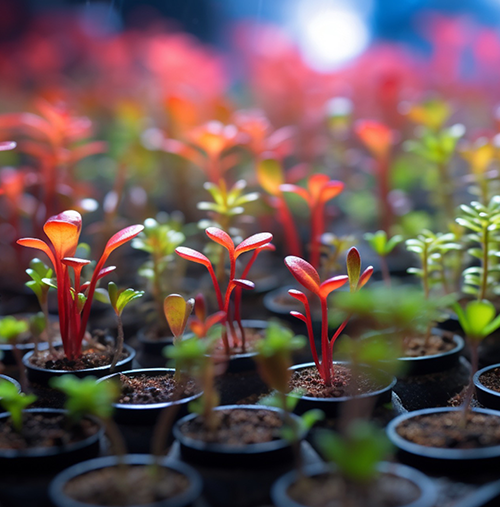
Scouts Farm: Your Eco-Farming Journey Starts Here
Scouts Farm is your one-stop destination to buy your dream eco farmland for sale in Chennai! We go beyond just connecting you with ideal eco farm land for sale in Chennai. Our comprehensive farm management services empower you at every step. Our experienced team helps you find the perfect eco farmland, navigate eco-farming practices like crop selection and natural pest control, and even handle day-to-day operations like sourcing organic supplies and managing irrigation. Partner with Scouts Farm and embrace a sustainable future – cultivate a thriving eco farm, contribute to a healthier planet, and enjoy delicious, eco-friendly harvests!
Faq
Discover solutions in our comprehensive
FAQ database
-
What are the Challenges of Eco-Farming in Chennai?
Eco-farming in Chennai might face challenges like limited land availability, particularly in urban areas. Access to organic inputs and knowledge of eco-friendly pest management techniques can also be initial hurdles. However, with proper planning, research, and support from the growing eco-farming community, these challenges can be overcome.
-
Is Eco-Farming Profitable?
Eco-farming can be a profitable venture, especially in urban areas like Chennai where consumers are increasingly seeking out organic and sustainable produce. While initial setup costs might be higher due to the reliance on organic amendments and natural pest control methods, eco-farms can often command premium prices for their products. Additionally, eco-farming practices can improve soil health and long-term productivity, leading to cost savings in the long run.
-
Can I Start Eco-Farming in Chennai?
Absolutely! Chennai offers a growing market for eco-friendly produce. Even with limited space, you can explore urban eco-farming techniques like vertical gardening, container farming, or rooftop farming. Consider starting small and scaling up as you gain experience.
-
Where can I Find Eco-Farm Land for Sale in Chennai?
While large plots of land might be ideal, eco-farming can be adapted to various scales. Researching online resources or contacting local agricultural extension offices can help you find suitable eco farm land for sale in Chennai. Companies specializing in sustainable agriculture, like Scouts Farm, might also offer guidance and land acquisition assistance.
-
What are some Resources for Learning More About Eco-Farming in Chennai?
Numerous resources are available to learn about eco-farming in Chennai. Local agricultural universities often offer workshops and extension programs. Online resources and forums dedicated to sustainable agriculture can also provide valuable information and connect you with a community of eco-farmers.

